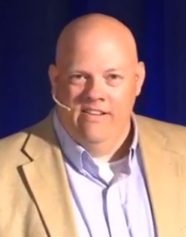A MESSAGE FROM THE REV. J.C. AUSTIN: FINDING SILENCE
There are two things in human society that were once common but are increasingly difficult to find in contemporary times. The first is darkness; for thousands of years, our ancestors relied on the moon and stars and whatever small fires or light implements (like torches or lanterns) they could use to illuminate their immediate surroundings. Today, however, the problem of “light pollution” at night is so severe that scientific evidence shows that it is actively and significantly harming the environment, including being a major contributor to the decline in the population of bees and other pollinators.
More poetically, the extent of nighttime illumination in  most areas of the country is so severe that it is difficult to see most stars at night, much less constellations and other astronomic events. In fact, central Pennsylvania has one of the few truly “dark sky” areas in the entire eastern United States, in the Susquehannock state forest.
most areas of the country is so severe that it is difficult to see most stars at night, much less constellations and other astronomic events. In fact, central Pennsylvania has one of the few truly “dark sky” areas in the entire eastern United States, in the Susquehannock state forest.
The second thing that is very hard to find these days is silence. A big part of that is similar to light pollution: our world is so filled with artificial sound, from chirping smartphones to blaring entertainment systems to machinery and traffic to airplanes overhead.
But another part of it is our discomfort with silence. People always talk about being afraid of the dark, but I wonder if we might be even more afraid of silence. When we’re with other people, we often interpret silence as a sign that something is wrong. Now, there is a kind of “weaponized silence” that people use in situations to make others uncomfortable or as a kind of passive-aggressive act of power.
But our reluctance to experience silence is much broader and deeper than that. I think we sometimes view silence as unproductive, like if we have time for silence then we should be filling that void with something useful. And sometimes we dislike silence because it encourages us to turn inward to attend to our own thoughts and feelings, and we don’t necessarily want to do that.
But that kind of silent contemplation has been recognized as essential to human spiritual and personal growth for thousands of years. Vows of silence are an ancient practice to literally keep ourselves from filling up the silence with our own voice and forcing us to be quiet, setting the tone for reflection and prayer.
It is for that reason that the Worship Committee decided to act on an idea submitted by one of you, and experiment with a few minutes of silence in the Traditional Worship Service. The Holy Ground Contemporary Service already has time and space for those seeking individual silent reflection, but traditional worship has tended to go straight from the sermon into a hymn, an affirmation of faith, and then other prayers and activities without a pause.
These two minutes of silence that we will be practicing during the stewardship season (through November 19) are designed to give us the time and space to respond to the sermon with personal reflection and prayer before we move on to the communal responses in the worship service. I commend this time and this experiment to you, and hope that you will let us know how it is impacting you when you’ve tried it a few times.
I do have one reminder for you as we do this. Because our minds are so attuned to productivity, they often wander quickly in silence, searching for some kind of “productive” use of the time. So first, remember that this is not dead time, but time for active reflection and prayer.
And second, if your mind is wandering in the midst of those, consider this: Dietrich Bonhoeffer, the great German pastor and theologian who resisted Nazism in the 1930s and 40s, taught his seminary students that if your mind wanders during silent prayer, it is often leading you to the people or situations on which your heart is fixed and thus particularly well-suited for prayer. So it is really a shepherd of prayer rather than a distraction away from it.
I hope you will find this experiment in silence meaningful, and I look forward to being with you in worship as we practice it!
Grace and Peace,
J.C.
